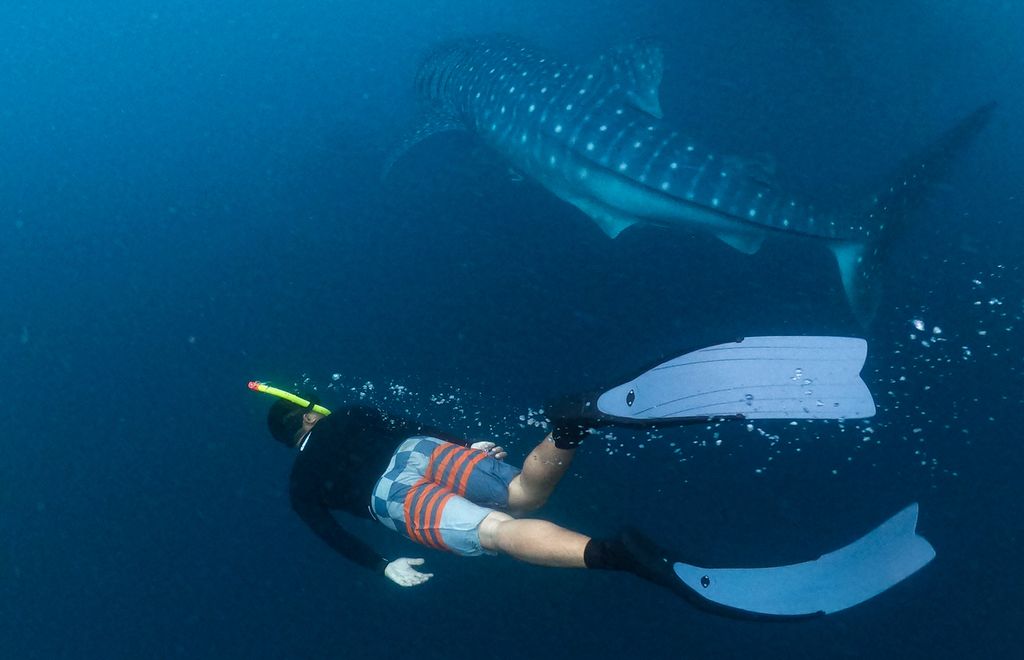In a world where natural wonders are rapidly disappearing, there remains a quiet sanctuary in eastern Indonesia where magic still happens every morning beneath the waves. Saleh Bay, nestled between the rugged coastlines of Sumbawa Island, is not yet overrun by tourism. Yet, it is home to something spectacular: the seasonal congregation of whale sharks—the largest fish on Earth.
If you’re seeking an unforgettable marine encounter, the whale shark Saleh Bay experience is one of Indonesia’s most extraordinary, and surprisingly, still under the radar.
A Hidden Gem in Sumbawa
While Bali and Komodo grab international attention, Saleh Bay (Teluk Saleh) remains a whispered secret among seasoned divers and wildlife enthusiasts. Located within West Nusa Tenggara province, this vast bay stretches over 1,500 square kilometers and offers a rich marine ecosystem—coral reefs, mangroves, seagrass beds, and deep blue waters perfect for pelagic life.
What sets Saleh Bay apart, however, is its growing reputation as a whale shark hotspot.
Why Do Whale Sharks Visit Saleh Bay?
Each year, from around April to October, several whale sharks are spotted in the northern part of Saleh Bay, particularly around bagan fishing platforms—traditional wooden floating rigs used by local fishermen. These fishermen attract small baitfish using lights at night. At dawn, leftover fish and scraps are released into the sea, unintentionally attracting whale sharks.
These gentle giants, drawn by the easy meals, often linger near the surface, gliding slowly through the calm waters. It’s here that travelers get the rare opportunity to snorkel or dive beside them, just meters away.
A Wildlife Encounter Like No Other
Unlike some other whale shark destinations, the Saleh Bay whale shark experience feels remarkably authentic and unspoiled. The number of tourists is still relatively small, and operators typically work closely with the local communities and conservation groups to ensure ethical and sustainable interactions.
Snorkeling beside a creature that can reach up to 12 meters (or more) in length—yet moves with such grace and gentleness—is humbling. Despite their size, whale sharks pose no threat to humans. They glide by peacefully, sometimes curiously circling swimmers before disappearing into the deep.
Many visitors describe the experience not only as thrilling but spiritual—a once-in-a-lifetime moment that remains etched in memory.
Conservation and Community Collaboration
One of the most compelling aspects of the whale shark Saleh Bay phenomenon is the way it has fostered community-based tourism and marine conservation. Local fishermen, once skeptical or unaware of the value of marine ecotourism, are now active participants.
Through training and education provided by NGOs and government initiatives, many have become guides, boat operators, and stewards of the ocean. Some have even named individual whale sharks they see regularly—treating them not just as wildlife, but as neighbors.
This shift has had a positive ripple effect. Fishing practices are slowly becoming more sustainable, waste is better managed, and the region is beginning to see the economic benefits of protecting natural marine heritage.
Planning Your Visit to Saleh Bay
If you’re planning to witness the whale shark Saleh Bay experience firsthand, here are a few tips:
- Best Time to Visit: April to October, when sightings are most frequent.
- Getting There: Fly into Sultan Muhammad Kaharuddin III Airport in Sumbawa Besar, then take a land transfer to Saleh Bay (usually about 2–3 hours). Some tour operators include transport.
- Tour Operators: Choose operators that follow ethical guidelines—no touching, no feeding, and limited numbers in the water.
- What to Bring: Reef-safe sunscreen, a good underwater camera, and a respectful mindset.
- Accommodation: While luxury is still limited, homestays and eco-lodges in the area are comfortable and offer unique cultural immersion.
Why Saleh Bay Deserves Global Attention
The whale shark Saleh Bay story isn’t just about swimming with a giant fish—it’s about a larger movement. A movement where remote communities find pride in their natural surroundings. A movement where tourism doesn’t destroy, but protects.
Saleh Bay represents what ecotourism can and should be: low-impact, community-driven, and conservation-minded. And for travelers, it offers the ultimate reward—authentic connection with nature, with people, and with one of the ocean’s most mysterious inhabitants.
Final Thoughts: A Journey Worth Taking
In an age when bucket lists are filled with overhyped and overcrowded destinations, Saleh Bay is refreshingly real. It’s a place where time slows down, the sea still whispers secrets, and whale sharks drift just beneath the surface—waiting, perhaps, for you.
Whether you’re a marine enthusiast, an eco-traveler, or simply someone craving a different kind of adventure, the whale shark Saleh Bay experience is a journey worth taking. It’s not just about seeing a whale shark. It’s about witnessing a community in harmony with nature, and becoming a part of that story—even if just for a moment.
